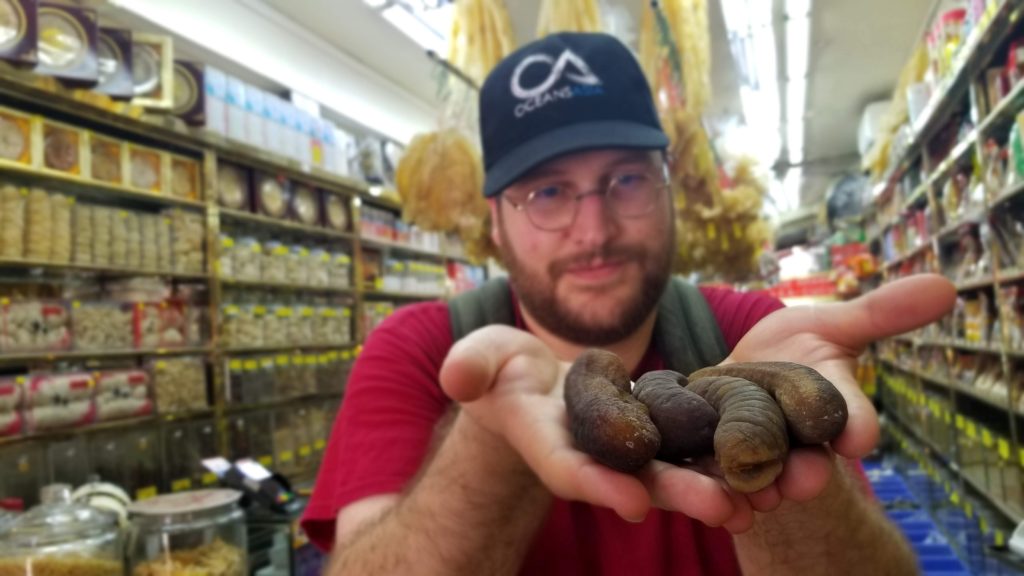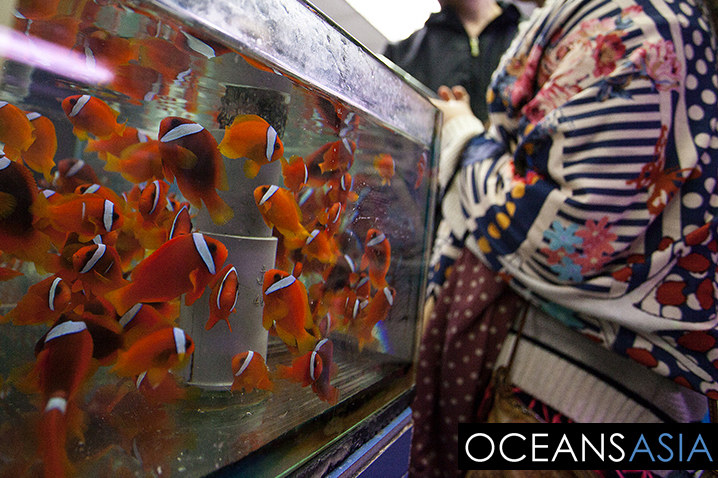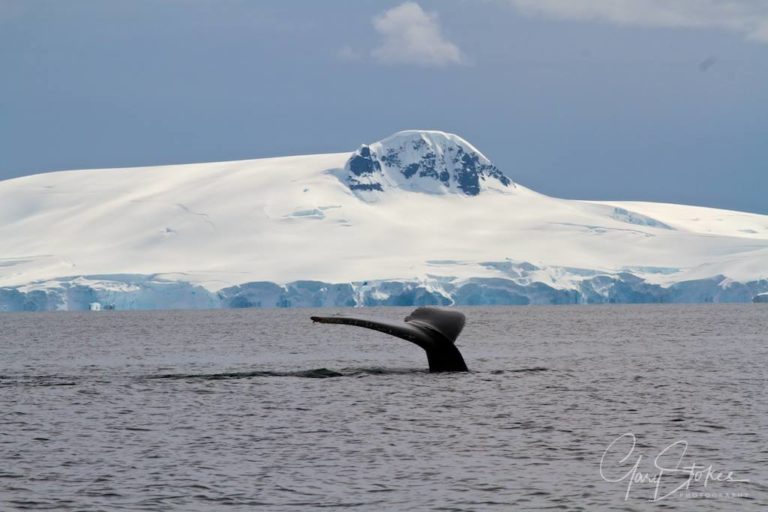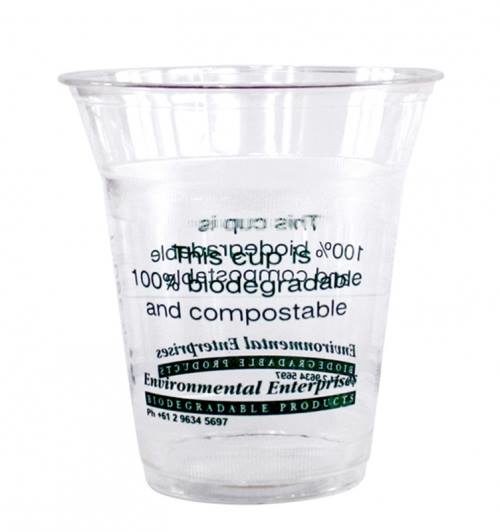New book features three chapters by members of the OceansAsia Research Team!
OceansAsia has been leader on the topic of wildlife crime in sea cucumber fisheries, and this month our work was featured in a new publication. The World of Sea Cucumbers: Challenges, Advances, and Innovations, published by Elsevier, and edited by Annie Mercier, Jean-Francois Hamel, Andrew Suhrbier, and Christopher Pearce, featured three chapters written by members of the OceansAsia Research Team!
This publication is the book of all things sea cucumber. It features 51 chapters by a network of experts exploring a wide range of topics. The book covers a wide range of topics including biology, ecology, fisheries, aquaculture, trade, crime, socioeconomics, culture, biotechnology, and more. As the blurb says:
Written by international experts in their respective fields, the book offers a unique outlook into the fascinating world of sea cucumbers while also providing valuable information to various stakeholders and researchers. Commercial fisheries and aquaculture programs are addressed, especially as they relate to emerging species, but the book also covers novel, understudied or lesser-known biological, ecological, and commercial aspects.
We are proud that the book includes three chapters by members of the OceansAsia Research Team, and we wanted to share a little about these chapters with you!
Chapter 13 – Sea Cucumber Crime

This chapter, written by Teale Phelps Bondaroff (Director of Research, OceansAsai) and Felix Morrow (Researcher, OceansAsia) explores the crime that pervades sea cucumber fisheries, through a review of the extant literature, drawing on detailed media studies and the modus operandi of the criminals that perpetrate this insidious wildlife crime.
The chapter begins with a brief introduction to sea cucumbers, sea cucumber fisheries, ways in which holothuroids are exploited, and the impacts that this exploitation has on their conservation status. It then explores the scale of sea cucumber crime, drivers of this wildlife crime, challenges relating to monitoring and enforcing regulations, and the often inadequate punishments imposed for violating these regulations.
The chapter then examines crime at each stage of sea cucumber fisheries supply chains:
- Forgery, fraud, and corruption that occurs before fishing begins.
- Political unrest and extortion relating to the negotiation of fisheries regulations and quotas.
- Illegal, unreported, and unregulated fishing/extraction of sea cucumbers; violent and armed robbery relating to sea cucumber catches
- The illegal gathering of wood used in processing.
- Misreporting, underreporting, and failing to report catches.
- The smuggling and laundering of sea cucumbers and associated commodities.
- Fraud and deception at the point of sale.
- Tax evasion and money laundering, with corruption undergirding all of these criminal acts.
The chapter concludes with an examination of the socioeconomic and physical harms of sea cucumber crime.
Chapter 6 – Beyond Beche-de-Mer
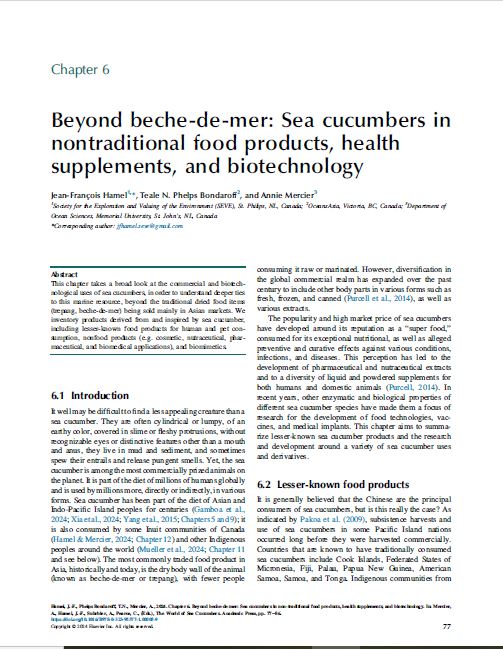
This chapter was written by Jean-Francois Hamel (Society for the Exploration and Valuing of the Environment), Annie Mercier (Department of Ocean Sciences, Memorial University), and Teale Phelps Bondaroff. The chapter takes a broad look at the commercial and biotechnological uses of sea cucumbers, in order to understand deeper ties to this marine resource, beyond the traditional dried food items (trepang, beche-de-mer) being sold mainly in Asian markets.
The chapter inventories products derived from and inspired by sea cucumber, including lesser-known food products for human and pet consumption, nonfood products (e.g. cosmetic, nutraceutical, pharmaceutical, and biomedical applications), and biomimetics.
Chapter 7 – Sea Cucumbers in Popular Culture
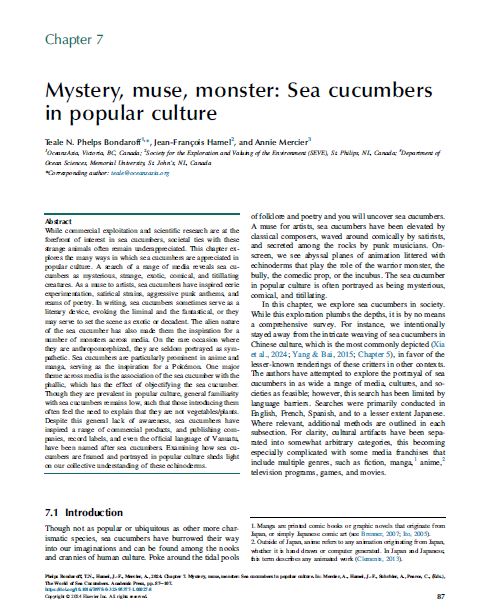
Written by Teale Phelps Bondaroff, Jean-Francois Hamel, and Annie Mercier, this chapter explores the many ways in which sea cucumbers are appreciated in popular culture. While commercial exploitation and scientific research are at the forefront of interest in sea cucumbers, societal ties with these strange animals often remain underappreciated.
A search of a range of media reveals sea cucumbers as mysterious, strange, exotic, comical, and titillating creatures. As a muse to artists, sea cucumbers have inspired eerie experimentation, satirical strains, aggressive punk anthems, and reams of poetry.
In writing, sea cucumbers sometimes serve as a literary device, evoking the liminal and the fantastical, or they may serve to set the scene as exotic or decadent. The alien nature of the sea cucumber has also made them the inspiration for a number of monsters across media. On the rare occasion where they are anthropomorphized, they are seldom portrayed as sympathetic. Sea cucumbers are particularly prominent in anime and manga, serving as the inspiration for a Pokémon.
One major theme across media is the association of the sea cucumber with the phallic, which has the effect of objectifying the sea cucumber. Though they are prevalent in popular culture, general familiarity with sea cucumbers remains low, such that those introducing them often feel the need to explain that they are not vegetables/plants.
Despite this general lack of awareness, sea cucumbers have inspired a range of commercial products, and publishing companies, record labels, and even the official language of Vanuatu, have been named after sea cucumbers. Examining how sea cucumbers are framed and portrayed in popular culture sheds light on our collective understanding of these echinoderms.
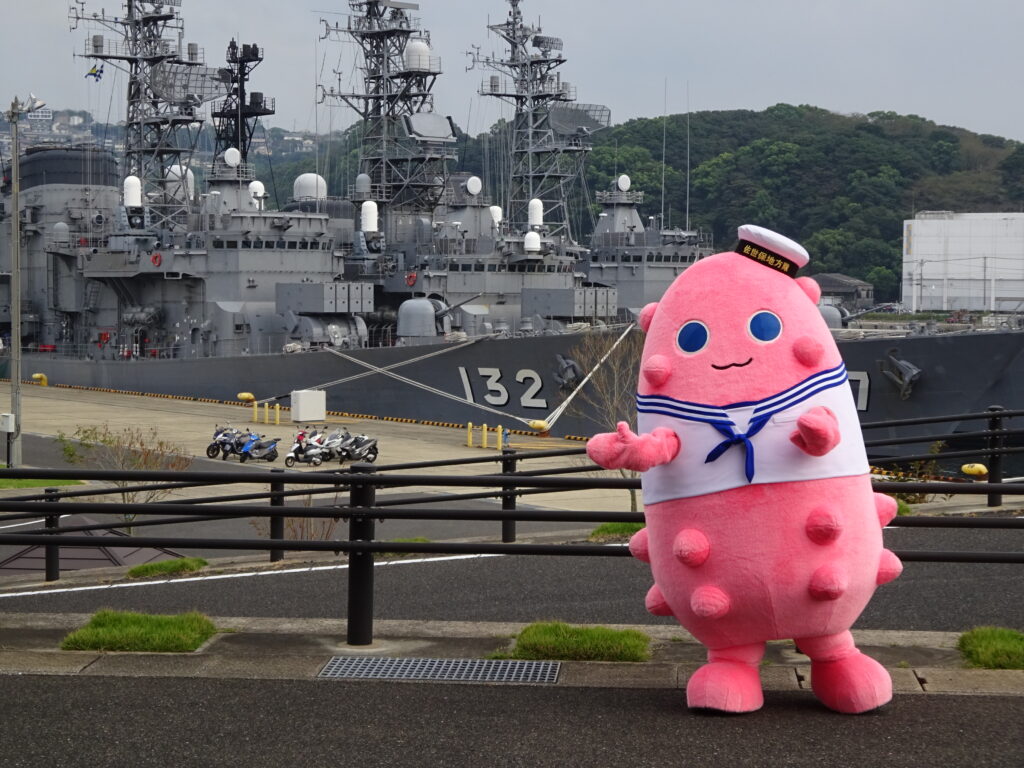
Our work on sea cucumber crime is ongoing. Our Research Team is currently investigating the scale of crime in Canadian sea cucumber fisheries and looking at hotspots for this form of wildlife crime around the world!
About the Author: Dr. Teale Phelps Bondaroff, is the Director of Research for OceansAsia. He is the world leading expert on sea cucumber wildlife crime and has published papers examining sea cucumber crime in Mexico and India and Sri Lanka.
